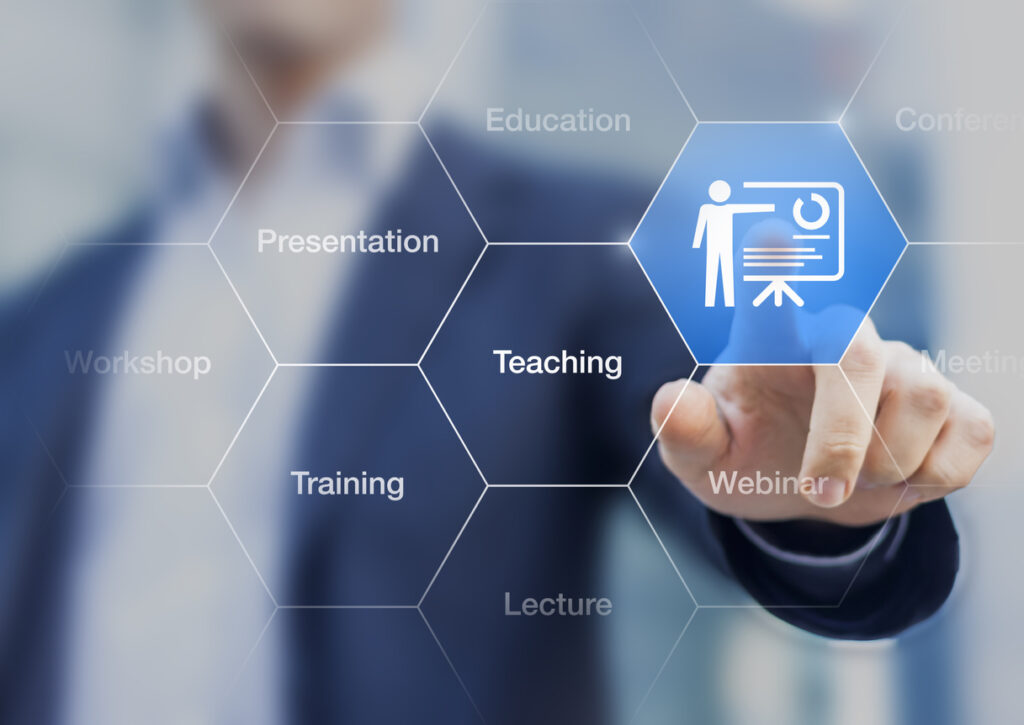What is next generation learning? And why does it have the attention of the board as well as learning professionals?
When done well, next generation learning enables organisations to build the transformative skills, mindsets and behaviours that are required, far faster and more cost effectively than ever before. It uses all the resources of the digital realm to optimise adult learning, dramatically speeding up the cycles of building people capability to realise competitive advantage.
Based on our experience, we have defined 12 principles to use as a blueprint to design next generation learning programmes that deliver tangible strategic outcomes. Each have human-centric and technological implications when designing transformative learning programmes at scale.
1. Bespoke learning journeys
The best adult learning programmes are a blended learning experience of self-learning, virtual and face-to-face classrooms, one-to-one (virtual) coaching, and structured team and peer learning activities. Next generation learning programmes enable learners to sequence and structure these activities to their own personalised learning journey over time.
Participants can access content as and when they want or need it. They can choose their preferred format and depth of learning, with the technology recommending further reading and resources. Some participants will prefer interactive learning methods, some will prefer one-to-one discussions either with a coach or peer, some prefer individual exploration of ideas and examples.
2. Strategic outcomes
Programmes should be designed with a clear set of learning outcomes for the individual, closely linked to specific strategic goals of the business.
For example, if the strategy requires the organisation to build business partnering capability, the organisation should first define what good business partnering means for them and then translate this into a set of specific competencies, skills and knowledge to be developed through the programme.
3. Scalable delivery
Next generation learning enables programmatic, transformative learning to be delivered at scale with very large cohorts. The technology platform dynamically creates peer communities and learning teams, automates the booking of classrooms and coaching sessions, and keeps participants on track through notifications and reminders.
It is also incredibly cost efficient as it applies expert resource as and when needed, using a very lean core delivery team.
4. Gamified experience
Fun, games and competition are at the heart of next generation learning – from gamifying systems and work, to creating simple games that teach complex ideas, business models and insights.
Games can be individual or promote competition between teams. Gamifying the learning experience enables the learner to test ideas in safe scenarios. Programmes are designed to reward participation and contribution within an engaging environment.
5. Connected experts
So much expertise already exists in organisations. Often expertise lies in pockets of excellence, known by some but not easily accessible by many. The challenge is finding and mapping existing expertise to be shared with others as and when they need it.
Next generation learning programmes create dynamic maps of pre-existing expert knowledge, enabling experts to ‘bubble up’ in learning communities through their contributions to resource libraries and conversations. These individuals become mentors and coaches for other participants – and the wider organisation.
6. Personalised learning
Next generation learning programmes are highly personalised, enabling individuals to maximise limited time for training. For example, a personalised learning journey is created dynamically for each individual based on what they choose to access or attend.
Learning teams are formed and personal development coaches are recommended automatically based on an individual’s location, role and level of expertise. Content is tailored based on learning style preferences and previous knowledge.
7. Flexible platform
Programmes are designed with flexibility in mind, both for the individual learners and the organisation. For individuals the timescale, activities, modes of learning and channels can be tailored to fit around their schedule and their needs. For organisations, the programme can be scaled up or down quickly depending on the strategic requirements. This flexibility dramatically increases participation and completion of programmes. The flexibility of these programmes also means that the focus and content can be easily adjusted to stay aligned with any new strategic goals.
8. Curated content
As with existing expertise, decent content is often readily available within organisations. The challenge is to provide curated content for learners together with the resources and conversations most relevant to them.
A successful model here is to provide just enough useful tools, concepts and examples around a topic and then encourage participants to contribute and share their own best practice and other resources. Participants very rapidly add their own materials, building a dynamic library of curated content for themselves, with popular resources bubbling up.
9. Multimedia and multichannel
In one recent next generation learning programme, a participant discussion emerged around “What was your favourite Sunday evening TV show?” – with many responding, “This learning programme”.
With the limited time available participants have, content needs to be compelling, on demand and relevant. Programmes that provide a full range of media, such as film, games, quizzes and animation, increase engagement and the effectiveness of learning.
Not only that, they should be available across any device, online and offline, automatically synchronising across platforms. Participants might book onto a classroom and watch an interactive video tutorial on their journey into work on their mobile device, but then participate in a virtual classroom or learning team activity at their desktop.
The digital environment places learning at the point that learners need it most, in the workplace. It’s vital that next generation learning technology platforms facilitate this in an integrated way.
10. People-centred
Too often, online learning is a technology-led, one-dimensional activity. Research has demonstrated that individuals excel when surrounded by the right support network. Next generation learning programmes put the learner at the centre and support them by closely linking with their line manager, a personal coach, peer experts and a learning team. This people ecosystem is motivating, encourages stickiness with the programme and ensures they get the maximum learning from the experience.
11. Community-based
We are a social species and learn better when doing so alongside a community of peers. Next generation learning programmes integrate a platform that builds and maintains a community of learners. Team activities, challenges and games provide opportunities for sharing and collaboration. Community animators actively encourage participation through nudging and connecting the group.
12. Real-time feedback
Creating effective learning programmes requires rapid and real-time feedback. Dynamic reporting and live feedback provides both the individual and the organisation with real-time analysis of the impact of learning. Whilst also demonstrating successes, transparent and consistently available visual feedback enables issues to be identified quickly and trajectories to self-correct.
In summary, next generation learning provides solutions to scaling up learning in a cost-effective way. Using these twelve principles to design world-class learning programmes will deliver a personalised learning experience at scale with transformative results.










